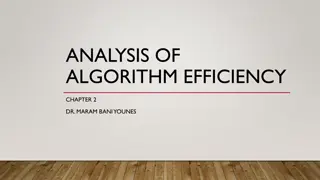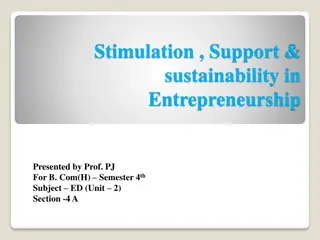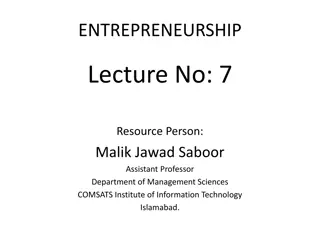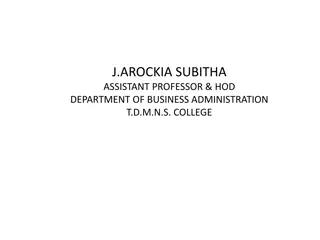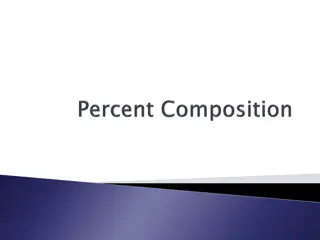Understanding Entrepreneurial Success: An Empirical Analysis of Characteristics
Entrepreneurs are key drivers of economic growth, taking risks and developing new ideas. Research distinguishes incorporated self-employed individuals as a distinct entrepreneurial group, showing they are more likely to come from high-income families, exhibit higher intelligence, and engage in non-routine tasks. The analysis questions whether being smart and illicit necessarily leads to true entrepreneurship and explores the correlation between education, family income, and entrepreneurial success.
Download Presentation

Please find below an Image/Link to download the presentation.
The content on the website is provided AS IS for your information and personal use only. It may not be sold, licensed, or shared on other websites without obtaining consent from the author. Download presentation by click this link. If you encounter any issues during the download, it is possible that the publisher has removed the file from their server.
E N D
Presentation Transcript
Entrepreneurs have been praised as the engine of economic growth Develop new ideas and products Take significant risk Public policy should aim to encourage entrepreneurial activity How do we analyze empirically the characteristics that define entrepreneurs and whether they are indeed more successful? Self-employed are very heterogeneous As a group, they look rather similar to salaried workers 2
Paper develops a new proxy: Incorporated self- employed Costs and benefits in becoming incorporated More beneficial if engaging in more typical entrepreneurial activities Indeed, this is a distinct group relative to unincorporated self-employed and salaried workers Engage in non-routine analytical tasks and non-routine direction, control, and planning tasks Higher earnings; more hours worked Key results: Entrepreneurs are more likely to come from high-income families Entrepreneurs are more likely to be smart (based on test scores) and illicit (based on reported behavior and record) Entrepreneurs are indeed more successful based on earnings across different tests and specifications 3
The distinction between incorporated and unincorporated self- employed is a clever way to capture the heterogeneity among self- employed and identify a group that looks more like entrepreneurs Although it would be useful to have more information on the full set of considerations driving the incorporation decision; e.g., taxes? It may not be too surprising that incorporated are different from unincorporated, in the way documented, as incorporation requires some sophistication Does the category of incorporated self-employed capture the true essence of entrepreneurship: innovative creative developments, new products Dig in more into the nature of the business to gain more information There must be ways to separate the group of salaried employees into subgroups based on proxies for sophistication Do incorporated self-employed ( entrepreneurs ) look so different from such subgroups ( the elite salaried employees )? 4
The most interesting results are probably on the fact that entrepreneurs tend to be smart and illicit: Illicit should naturally lead to being self-employed; hard to maintain an employment relationship But, does it necessarily lead to the true essence of entrepreneurship: innovative creative developments, new products? Result found only in interaction between smart and illicit Why no direct effect? Why consider this interaction and not with other variables? E.g., interaction between smart and family income? The usual way we think about entrepreneurs being non- conservative translates into school drop-outs But here years of education is positively correlated with entrepreneurship; why? How can we reconcile with overall message of smart and illicit? 5
The basic nature of entrepreneurial activity involves high levels of risk taking When coming up with an innovative new product, there must be significant uncertainty on its future success leading to a large variance in future earnings Yet, the evidence in the paper does not capture this important dimension of entrepreneurship No evidence that incorporated self employed at the bottom of the distribution are doing much worse than salaried employees at the bottom of the distribution This goes back to the question of whether the proxy for entrepreneurs captures true essence of entrepreneurship rather than just sophisticated self- employed 6
Finance matters: Evidence in the paper is fairly limited concerning the role of finance; only shows that family income has positive effect on being incorporated self-employed This could capture other things rather than access to credit (despite many controls) No direct evidence for the role of the financial sector Social norms regarding non-routine behaviors might matter too This is a tricky conclusion Encouraging illicit behavior will surely backfire by changing the system as a whole How to design a system that tolerates exactly the right amount of non-routine behavior? 7
Identifying entrepreneurs characteristics and success is an important task Paper provides a clever and novel look at the data and achieves important progress relative to existing literature There is room for more work on identifying true entrepreneurship in the data, studying its relation to illicit behavior and risk taking, and deriving lessons for policy and developments These will surely wait for the next paper 8















